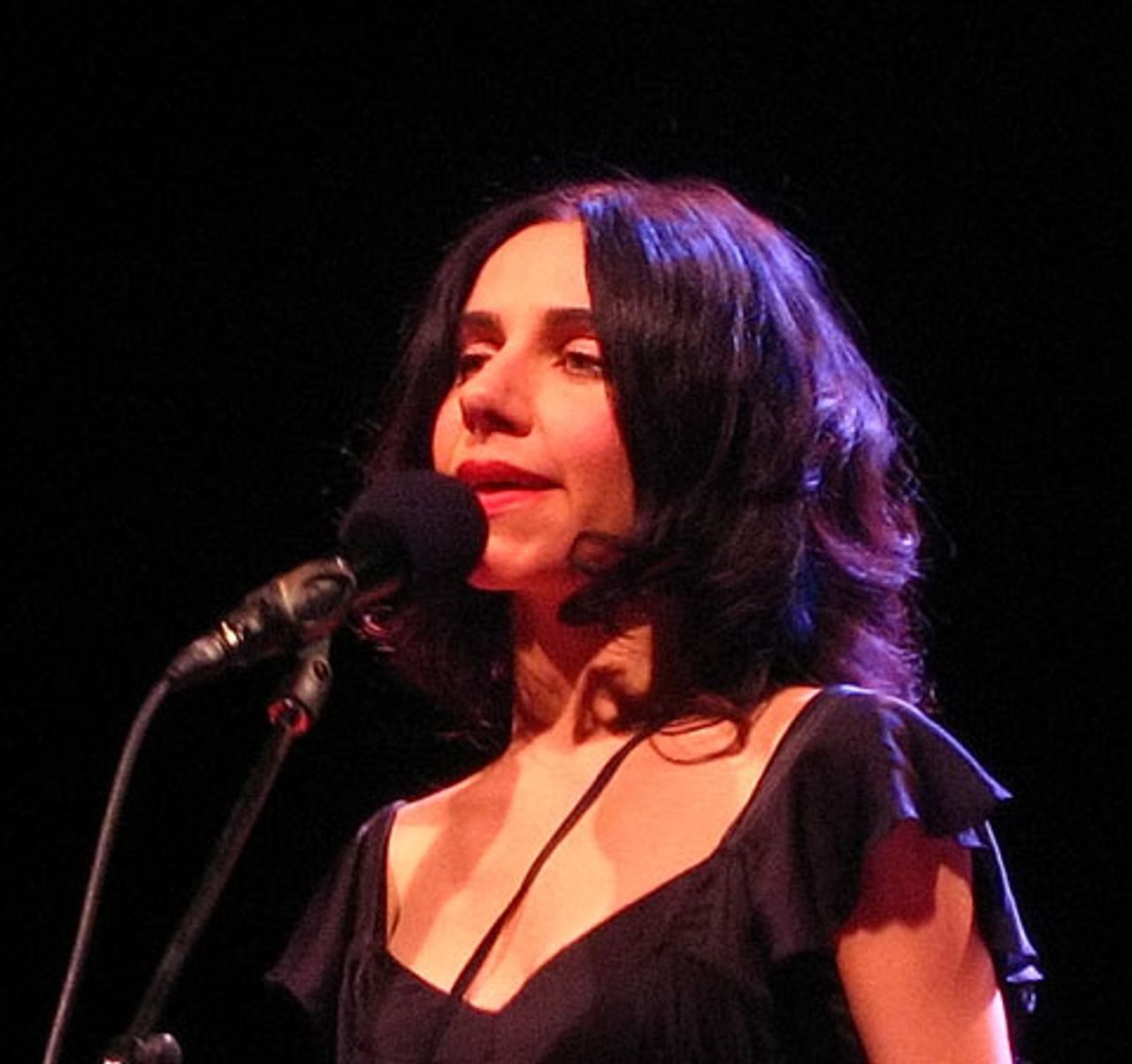 PJ Harvey (Photo: Amy Preece)
PJ Harvey (Photo: Amy Preece)In 1996, British singer-songwriter PJ Harvey collaborated on an album with composer and multi-instrumentalist John Parish. The work, Dance Hall at Louse Point, stands out as one of the most interesting, challenging, and emotionally rich of Harvey’s career. While Harvey and Parish have continued to collaborate since that time, no new recordings have been released under both their names until a new album this year, A Woman a Man Walked By.
This writer recently had the opportunity to see Harvey and Parish perform in Covington, Kentucky, a small city just across the Ohio River from Cincinnati. It was a remarkable concert, with both Harvey and Parish setting aside more popular works from their careers as solo artists in favor of those songs the two had composed together on Dance Hall and A Woman a Man Walked By. Harvey’s voice was in fine form, as was Parish and his band.
As a songwriter, Harvey tends to avoid purely autobiographical material in favor of assuming characters and writing from their vantage points. As she told Pitchfork.com, in a 2007 interview: “I think I’m interested in exploring all manner of being human. The essence of what it is to be a human being on Planet Earth. I think that incorporates many things—obviously fears, but also love, passion, happiness, joy, anger. I’m interested in everything, in expressing as much as I can about human nature and being a human being and what interests me.”
Among the most “human” songs from the new album and of those performed that night in Covington was “The Soldiers,” most of which featured only Harvey’s voice and Parish on ukulele. The lyrics are haunting and unsettling: “I imagine a dream in which I’m a soldier and I’m walking on the faces of dead women and everyone I’ve left behind me.” Following the nightmare described, the narrator begs to be set free from such disturbing conditions: “Send me home restless, send me home damaged, send me home dispossessed, send me home damaged and wanting.”
During certain parts of the song, Harvey would raise herself up and down on one foot as though marching in place, one of several occasions on which she used physical movement to add to the stories and emotions communicated by her songs. Parish’s fragile accompaniment on ukulele was the perfect answer to the lyrics and vice versa.
In many ways, “The Soldiers” found a companion piece in “Civil War Correspondent,” taken from Dance Hall at Louse Point. In this song, the “correspondent” sings: “Words leave my heart dry, words can’t save life, love has no place here, no joy, no tears.” And in the chorus: “I shout but he don’t hear. I put down on a page, ‘Darling spare me your tears, just send me the light of day.’”
Both songs contain an ambiguity: is Harvey singing directly of someone who has experienced war, or is she using that experience as a metaphor for someone who is struggling with his or her own life, love and loss? The use of war imagery is interesting. One gets a sense that whatever personal struggles may be involved, they are connected to the world in some intimate way, a way in which Harvey is perhaps only just able to grasp.
One finds a similar device in other songs from the new album, in which personal relationships have a connection to places, times, something in the air, etc. “Leaving California,” a perfect example of this, was another of the more exceptional songs performed in Covington. Using her falsetto range, something Harvey has more regularly featured in her recent work, she sang, “No one but me is walking under palms that give no shade. I’m leaving you today.” And later: “Oh, give me some shade, Oh, England, come soon. How could I have believed that I could live and breathe in you?” “California killed me,” she adds finally, with frailty.
Is it someone in California, California itself, or both that has left the song’s narrator so demoralized? One feels it is all woven together. Similar to “Leaving California,” in this regard, was the evening’s beautiful closing number “April,” in which Harvey sang, “I dream April, April that I’m walking that I’m watching. April, your rain overcomes me.”
Above all, what came through during her performance in Covington was Harvey’s compassion, her great sensitivity toward her fellow human beings. The melodies composed by Parish could not have found a better voice to bring them to life.
The duo first began collaborating in the 1980s when Harvey joined Parish’s band Automatic Dlamini. While she left not long after to form her own trio in the early 1990s, called PJ Harvey, and then began a career as a solo artist just two albums later, she and Parish continued to collaborate whenever possible, with Parish coming aboard to serve as producer for some of her material and provide instrumentation.
The best of their collaborations released under Harvey’s name was the excellent To Bring You My Love album. On the recordings released under both their names, Parish composes the music and Harvey writes the lyrics. Both have their strengths and weaknesses as artists, but it is safe to say they are at their best when working together. Each draws something out of the other that he or she doesn’t appear to have been able to find anywhere else.
Even as she is currently on a world tour in support of A Woman a Man Walked By, Harvey has already recorded demo tracks for her next solo album. John Parish will likely be a contributor.
